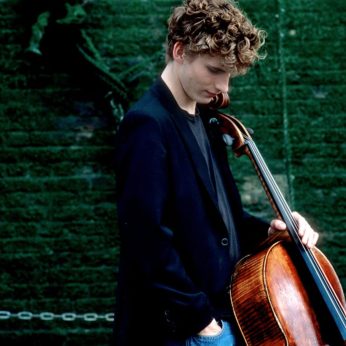Composer: Edvard Grieg (b. 1843 - d. 1907)
Performance date: 02/07/2014
Venue: St. Brendan’s Church
Composition Year: 1883
Duration: 00:26:29
Recording Engineer: Richard McCullough, RTE
Instrumentation: vc, pf
Instrumentation Category:Duo
Artists:
Andreas Brantelid -
[cello]
José Gallardo -
[piano]

Grieg’s magnificent cello sonata, like
Mendelssohn’s, was written for a cello-playing brother. This is a work that
pulls no punches with its powerful themes and massive climaxes. The melodies
seem to draw their power from the spirit of the cello itself, while the
keyboard’s impatience is palpable, forever seeking to climb the next mountain.
The cello begins quietly with the main
theme over the piano’s threatening accompaniment, but the piano, like a gale
from the North, soon rises to fever pitch and all but drowns the cello in
crashing chords and octaves. All this is over in a few moments, closed by a
brief and even more violent coda, and we are left in stunned silence. Then,
magically, three peaceful C-major chords announce the arrival of calm weather.
As the cello sings the theme over rich harmonies so typical of Grieg, one can
almost feel the warmth of the sun. An expressive dialogue between the instruments
carries the theme through various keys before C major excitedly re-emerges and
cascades of arpeggios sweep us into the development. One senses trouble on
hearing the second subject in a minor key and indeed another gale overwhelms us
in with the cello and piano exchanging lightning bolts in ever-quicker
succession. This storm never entirely dies out and reappears in full force in
both the recapitulation and the coda.
The gorgeous slow movement opens with a
poignantly beautiful chord progression, as if the notes are dropping down from
a clear sky. When the cello takes over Grieg has a seemingly endless resource
of harmonies with which he colours the single, repeated notes of the melody.
Such beauty cannot last and it inevitably gives way to brooding leading to
increasingly violent outbursts, culminating in a passage where the piano cries
out in pain. Out of this climax we hear, pianissimo, a trace of the first
theme, and gradually the whole theme returns with even more beguiling
harmonies. After a climax worthy of Rachmaninov, a delicate coda concludes the
movement.
The folk-style finale is introduced by a
ghostly fragment for solo cello, the kind of mysterious idea that you know will
come back to haunt you. The exuberant opening theme then takes over leading
eventually into the second theme, which is actually created from the first subject
slowed to half tempo. This seemingly naïve material is later transformed into a
series of explosive climaxes, culminating in a dramatic re-appearance of the
otherworldly fragment from the opening bars. A full recapitulation follows,
with a brilliant coda in which the now far from mysterious theme makes its final,
triumphant appearance.
Copyright © 2025 West Cork Music. All rights reserved.
Designed and developed by Matrix Internet